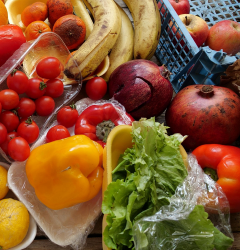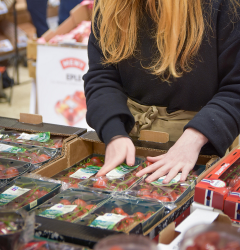20 Dec

Grocery Green Tactics: Waste Management Trends to Watch in 2024
The Growing Importance of Waste Management in the Grocery Industry
In recent years, waste management has ascended to the forefront of operational priorities for the grocery industry. This shift is fueled by a combination of factors, including increasing environmental awareness, consumer demand for sustainability, and tightening regulations around waste disposal and recycling. The grocery sector, known for generating significant amounts of organic and packaging waste, now faces the urgent task of rethinking its waste management strategies. This imperative is not just about compliance or public image; it’s rooted in a deeper understanding of the industry’s impact on the environment and its long-term sustainability. The consequences of inadequate waste management are manifold, ranging from increased carbon emissions and environmental pollution to the inefficient use of resources. For grocery stores, this not only affects their ecological footprint but also has economic implications, such as higher operational costs and potential loss of customer goodwill. Conversely, effective waste management can lead to cost savings, improved customer loyalty, and enhanced brand reputation.
Introducing ‘Grocery Green Tactics’ and the Role of AI
In response to these challenges, the concept of ‘Grocery Green Tactics’ has emerged as a comprehensive approach to reimagining waste management within the grocery sector. At the heart of these tactics is the integration of Artificial Intelligence (AI). AI is proving to be a game-changer, offering innovative solutions that go beyond traditional waste handling methods. These solutions include AI-driven analytics for better inventory management, reducing food and packaging waste; smart sorting technologies that enhance recycling efficiency; and AI systems that facilitate upcycling and composting efforts. AI’s ability to process and analyze large volumes of data is pivotal in understanding waste patterns, predicting future waste generation, and optimizing resource allocation. For instance, AI can forecast product demand with remarkable accuracy, enabling grocery stores to order and stock precisely what is needed, thus minimizing overstocking and subsequent waste. Similarly, AI-powered sorting systems can accurately differentiate between various types of waste, ensuring more effective recycling and reduction of landfill contributions. In essence, AI is not just an operational tool; it’s a strategic asset in the journey towards sustainable grocery practices. Its role in advancing ‘Grocery Green Tactics’ is multifaceted – from enhancing operational efficiency and reducing waste to contributing to a greener planet and a more sustainable future for the grocery industry. As we delve deeper into 2024, the integration of AI in waste management is set to redefine the grocery landscape, heralding a new era where technology and sustainability converge to create smarter, greener grocery practices.
Understanding Zero-Waste Policies
The concept of zero-waste policies in the grocery industry is a bold and progressive approach aimed at drastically reducing, and ideally eliminating, waste. As we look at the landscape of 2024, these policies have become more than just eco-friendly initiatives; they are integral to a store’s operational and sustainability goals. Zero-waste policies focus on the complete lifecycle of products, from sourcing and packaging to disposal and recycling. The aim is to ensure that all materials are reused, recycled, or composted, leaving nothing to be sent to landfills or incinerators. The significance of these policies in 2024 cannot be overstated. Amid growing environmental concerns and increasing regulatory pressures, zero-waste practices offer grocery stores a way to demonstrate their commitment to sustainability, meet regulatory standards, and respond to the eco-conscious consumer base. These policies are also indicative of a shift towards a circular economy, where resource use and waste are minimized, and the entire value chain is optimized for sustainability.
Implementing Zero-Waste Policies in Grocery Stores
Grocery stores in 2024 are adopting various strategies to embrace zero-waste policies:
1. Bulk Buying and Packaging Reduction: Many stores have expanded their bulk buying sections, allowing customers to purchase the exact quantities they need, thereby reducing packaging waste. Stores are also shifting to biodegradable or compostable packaging materials.
2. Comprehensive Recycling Programs: Enhanced recycling programs are a staple in grocery stores, where customers can return not just common recyclables but also hard-to-recycle items. Stores have invested in better waste sorting facilities to ensure maximum recyclability.
3. Sustainable Sourcing: Emphasis on sourcing products from suppliers who practice sustainable production methods, including minimal packaging and responsible waste management.
4. Educating Customers: Stores are increasingly taking on the role of educating consumers about waste reduction. This includes in-store signage, workshops, and marketing campaigns focused on sustainable practices.
5. Technology Integration: Advanced technology, particularly AI, plays a critical role in managing inventory, forecasting demand, and thus reducing overstock waste. AI also aids in efficient waste sorting and tracking the success of recycling programs.
These examples illustrate the proactive steps grocery stores are taking to align with zero-waste objectives. By implementing these policies, they are not only mitigating their environmental impact but also setting a new standard for sustainability in the retail sector. As 2024 progresses, these zero-waste initiatives are expected to become more widespread and sophisticated, further cementing the grocery industry’s role as a leader in environmental stewardship.
Data Analytics in Waste Reduction
In the journey towards sustainable waste management, data analytics has emerged as a crucial tool, especially in the context of the grocery industry. The ability to collect, analyze, and interpret large volumes of data is fundamental in understanding the intricacies of waste generation and management. Data analytics provides grocery stores with insights into the types and quantities of waste produced, identifying key areas where waste reduction efforts can be most effective. By analyzing purchase histories, customer behavior patterns, seasonal trends, and product lifecycle data, grocery stores can gain a comprehensive understanding of their waste footprint. This information is vital in crafting strategies that target specific types of waste, whether it’s excess packaging, unsold perishable goods, or non-recyclable materials. Moreover, data analytics can highlight inefficiencies in the supply chain and operational processes that contribute to waste, allowing stores to address these issues directly.
AI-Driven Analytics in Inventory Management
AI-driven analytics takes data analysis a step further by not only interpreting past and present data but also predicting future trends. In the context of inventory management, this is a game-changer. AI algorithms can forecast demand with a high degree of accuracy, helping stores to optimize their stock levels and reduce overstocking, which is a major contributor to waste, particularly for perishable items. For example, an AI system can analyze data from various sources, including weather patterns, local events, and historical sales data, to predict spikes or drops in demand for certain products. This enables grocery stores to adjust their orders accordingly, ensuring they have just enough stock to meet customer needs without excess that leads to waste. Moreover, AI-driven analytics can identify patterns in product sales and shelf life, enabling stores to implement dynamic pricing strategies. Products nearing their expiration date can be automatically discounted to encourage quick sale, reducing the likelihood of them becoming waste.
These sophisticated AI systems can also integrate with supply chain management, allowing for real-time adjustments in ordering and delivery schedules based on predictive analytics. This not only minimizes waste but also enhances overall supply chain efficiency. The integration of data analytics, particularly AI-driven analytics, in waste management represents a significant step forward for the grocery industry. By leveraging the power of data, grocery stores can transform their approach to waste reduction, moving from reactive to proactive strategies. This not only contributes to a more sustainable operation but also aligns with the growing consumer expectation for environmentally responsible retail practices. As AI technology continues to evolve, its role in enabling more efficient and waste-free grocery operations is expected to become increasingly pivotal.
Future Implications
Looking towards the future, these trends have significant implications for both the grocery industry and the environment:
• Operational Efficiency: AI’s ability to predict and optimize will lead to more efficient operations in grocery stores, reducing costs and improving profitability.
• Sustainability Goals: The integration of AI in waste management aligns with broader sustainability goals, helping stores reduce their carbon footprint and environmental impact.
• Consumer Expectations: As consumers become increasingly aware of environmental issues, AI-driven waste management strategies can enhance brand loyalty and meet customer expectations for sustainable practices.
• Regulatory Compliance: With environmental regulations becoming more stringent, AI can help grocery stores stay compliant and even ahead of legislative requirements.
• Innovation and Growth: The continuous evolution of AI technology promises further innovations in waste management, offering new opportunities for growth and sustainability in the grocery sector.
In conclusion, the role of AI in revolutionizing waste management in grocery stores is a critical development in our journey towards a more sustainable future. As this technology continues to evolve and integrate deeper into retail practices, we can expect to see not only more efficient and eco-friendly grocery stores but also a significant positive impact on our environment. The trends of today are setting the stage for a greener, more sustainable tomorrow in the grocery industry.
Related Post
Tags
Keywords
Tags
Resources
© 2020-2024 Link Retail. All rights reserved.











